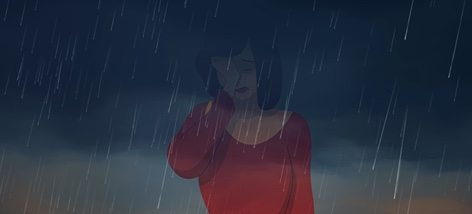Define the Line: the battle against domestic abuse
Think the signs of domestic violence are obvious? Think again. Almost 1 in 3 young people find it difficult to separate a caring action from a controlling one, according to ‘Define the Line’, a study by the national domestic violence charity Refuge in partnership with Avon. The study worryingly found that a third of those interviewed wouldn’t know where to go for support, despite the fact that one in two young women have experienced controlling behaviours in a relationship. So even if you haven’t, what about the person next to you?
Refuge is the largest provider of specialist domestic violence services across the country and currently supports almost 5,000 women and children. While their focus in on women, who are the most frequent victims of domestic abuse, their services are also available to men suffering from verbal or physical abuse in a relationship.
It’s evident that domestic violence isn’t restricted to the stereotypes of victims that we see on our screens. Victims of domestic violence wear faces other than that of the long-suffering mother subject to physical violence from an aggressive husband. Sadly, anyone, regardless of race, class, education, or age can encounter an abusive relationship – and of course, regardless of their gender identity or sexual orientation.
Victims of domestic violence wear faces other than that of the long-suffering mother subject to physical violence from an aggressive husband.
Domestic violence can also include non-physical coercion or control, with a 32% of young people admitting that a controlling partner had prevented them from living their life, for instance by stopping them from socialising or going to work. This can serve as a warning sign for a later escalation into physical violence; but even alone, the consequences of such coercion and control can have thoroughly damaging repercussions on the victim. Nearly half of young adults said that experiencing these behaviours made them feel intimidated, humiliated, or worthless.
Could we draw links between the frequency of such experiences and the fact that almost two fifths of 16-21 year-old girls feel that coercive behaviours in relationships have become normalised because of the amount of abuse they see in the media? The excusing of abusive behaviour from high-profile individuals such as Chris Brown, OJ Simpson or NFL player Greg Hardy certainly cannot help in setting a good standard for young men ad women. When Eminem wrote a lyric about wanting to “punch Lana Del Rey twice, like Ray Rice”, in reference to Hardy’s fellow player, who was caught on video knocking his then-fiancée unconscious, many rushed to defend the artist. The constant attempts to divert the blame away from the perpetrator and onto the victim are a real impediment to progress.
The constant attempts to divert the blame away from the perpetrator and onto the victim are a real impediment to progress.
Alarmingly, 8% of the 16-21 year-old girls said they haven’t had any exposure to relationships based on equality and respect. It would not be unreasonable to argue that the silencing effect of controlling behaviours are provoked by society’s limitations on when women can speak out against the violence they experience. Even with instances of sexual violence against young women on campuses, like 2015’s Stanford Rape Case, the misogynist cross-examination of victims hardly instils confidence in young women to speak out.
As part of Refuge’s campaign to raise awareness, it has worked with the BRIT- nominated, singer-songwriter Frances on a powerful and moving video for her song ‘Grow’. It uses the theme of invisibility to demonstrate the increasing isolation of a woman experiencing domestic violence, a figure based on real life survivor and Refuge user, Melanie Clarke. She wanders through life downtrodden until she meets a character representing Refuge and with their support, is able to rebuild her life and ‘grow’, gaining visibility again.
The video ends with links to the Refuge site for support and advice, but it most importantly bypasses typical narratives of abuse and is effective in its avoidance of showing any physical violence. Instead, it focuses on the isolation of ‘behind closed doors’, and the worsening emotional effects on ‘Melanie’, as her real-life counterpart has discussed. This emphasis on emotional changes is critical when more than a quarter of the study’s interviewees said that a friend, or someone they knew, had been a victim of an emotionally abusive relationship.
I have personally seen this even in a loved one who had witnessed the abuse of a parent and so, in theory, should have been aware of the signs of an abusive relationship. However, with 52% of young adults learning about positive relationships from their parents, it is easy to see how the absence of a healthy example could have painful consequences later in one’s life.
With 52% of young adults learning about positive relationships from their parents, it is easy to see how the absence of a healthy example could have painful consequences later in one’s life.
For Warwick students, information available on domestic abuse seems to be limited to a web page on the University’s counselling service page and a brief paragraph with helplines on the Warwick SU page. Even a 2016 report and additional guidelines for universities on violence against women, harassment, and hate crime published by the Universities UK taskforce, has woefully little direct discussion of domestic violence, let alone coercive and controlling behaviours.
Therefore, it’s clear to see why Avon will be supporting Refuge in working with policy makers and media partners to raise awareness regarding domestic abuse. ‘Define the Line’ plans to use social media campaigns and collaborations with influencers to reach young people directly. When the aforementioned 8% of young women state they have not seen any healthy relationships and have little access to information explaining the complex layers of domestic abuse, it is clear that real change needs to be brought about, both for university campuses and society as a whole.
‘Grow’ video: https://www.youtube.com/watch?v=hZRoXz7hxcU
Warwick SU advice page: https://www.warwicksu.com/advice/health/relationships/abusiveviolentrelationships/

Comments